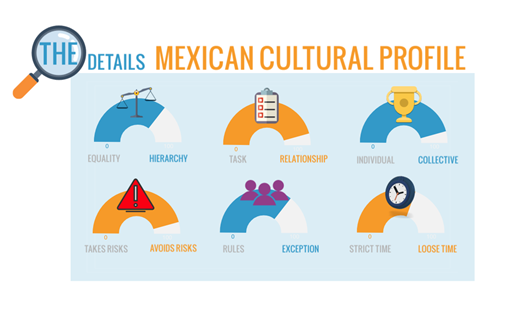As anyone who has completed an international assignment will tell you, each country has cultural differences and norms that can make expatriate life challenging. In this continuing series spotlighting country cultural differences, we will examine some of the aspects of culture in Mexico, a common location for international assignments. Below, our long-time trusted partner, IOR Global Services, provides important information for successful cultural integration.
Quick Facts
- Group Orientation: In Mexico, a person’s identity is defined by the group rather than the individual. This is largely due to the strong role of the family and historical influence of Roman Catholicism regardless of religious affiliation. Family and humility remain of primary importance, and group harmony is preserved through face-saving indirectness.
- Relationship Focused: In business and social settings, personal interactions and previously established relationships tend to take precedence over tasks and timelines. Take the time to foster and develop personal relationships in business. It is through relationships and loyalty that things get done in an effective and timely manner.
- Hierarchy: In Mexico, many relationships tend to be vertical with apparent patterns of rank and status. While this condition is rapidly changing due to the large presence of foreign investment in the country, employees are still less likely to challenge authority and suggest solutions for problems unless specifically asked or told. While divisions among gender, social class, ethnicity, and education are still visible in the workplace, professional roles are expanding to include more diverse backgrounds.
- Need for Certainty: Most Mexicans are comfortable with guidance and expect a structured approach and clear direction to minimize risks. Employees tend to work best with clearly presented tasks. Decisions are made in a calculated manner and may take a long time to finalize, focusing on and examining all possible outcomes. Certainty is often reinforced based on the strength of/and loyalty within relationships.
- Preference for Exceptions: The country has a rich heritage and is diverse and culturally complex. Rather than strict adherence to a general rule, Mexicans tend to consider the details of each situation based on relationships and broader context.
- Fluid Time: Mexico generally operates on polychronic time. In the work environment, scheduling is necessary, but punctuality can be flexible based on hierarchical levels. Socially, time tends to be quite fluid. Interruptions, disruption, and revision to agendas should be expected.
Fun Facts
- Mexico is composed of 32 states and a Federal District (the capital city). With a population of over 9 million people, Ciudad de México, D.F. (Mexico City) is the largest city in North America. The official name of the country is Estados Unidos Mexicanos – The United States of Mexico.
- The educated and skilled workforce along with a free trade climate and relative low cost of labor (when compared to countries north of the border) add to Mexico’s hospitable climate for manufacturers (especially in automotive, medical device, and aerospace industries), investors, and retirees.
- Along with approximately 364 dialects, Mexico has 68 indigenous languages that are recognized as national languages, including Nahuatl, Yucatec Maya, and Mixtec.
Watch Out – Cultural Taboos
- Avoid using “Americans” when referring to the citizens of the United States. Mexico is also a North American country, and people may find it arrogant/dismissive when the term is used solely to refer to those from the USA.
- Do not give critical feedback in large meetings or too directly; do not expect to receive direct, critical feedback from employees.
Communication in Mexico
- Indirect: To preserve harmony, Mexicans tend to imply/suggest what is meant and are reluctant to give a direct answer, particularly if negative. The way people interact is determined by the relationship and hierarchical levels. The message is often conveyed not only through words but also within broader context. How something is communicated often precedes what the actual message is.
- Formal: Interactions are polite and formal in this more socially conservative society. Language is often used to reinforce hierarchy and Mexicans employ professional and courtesy titles to honor educational levels as well as show deference toward positions, rank, age, gender, and status. While changing rapidly among the younger generations, formality continues to be used as a reflection of care, respect, and commitment in interactions.
- Emotionally Expressive: In Mexico, passion and emotional sensitivity are respected and admired to help to establish trust and credibility. Persuasion is accomplished through passionate commitment to one’s perspective, not through cold factual logic. Frequently, nonverbal behaviors are used to visibly display feelings and add meaning to the message.

*image courtesy of IOR
Want to learn more about an assignee’s day-to-day life in Mexico (or any other country)? Please contact your Aires representative.


